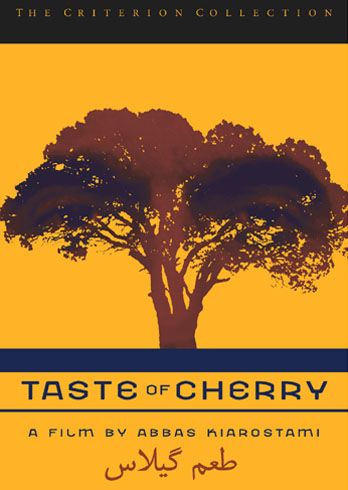
“ The taste of mulberries saved my life
Don’t you want to watch the sun rise, watch the moon and stars at night?
Don’t you want a taste of cherry?”
These words perhaps changed Mr. Badii’s life and brought him back from the brink of his death. We’ll never find out for sure. But we can hope.
I have written before about Iranian movies and how they push the envelope of conventional filmmaking. Abbas Kiarostami’s Taste of Cherry is another film that makes you rethink the scope and appeal of cinema. A movie need not tell a story every time. You might as well read a novel or a short story if you want that. The scope of celluloid is much bigger than just story-telling. A film can be a simple slice of life. A piece cut out from the fabric of everyday life, with ordinary people, with common hurts and pains held up on the screen with extreme deftness and clarity. Iranian films have done that for me.
Mr Badii drives around the dry dusty landfill just outside the city in his Range Rover, with sad sunken eyes and a brooding mood that reflects the harsh, parched earth that he drives around on. He accosts strangers working at the landfill with a strange request. He has identified a spot by a tree on the hill where there is a hole in the ground and he will take a doze of sleeping pills and lie down in this hole for the night. All he asks of the stranger, for a sum of 200,000 tomans, is to come and see if he’s alive the next morning and if he does not respond, to throw some earth on his grave.
We do not find out what the reason for his request is. The viewer is not given the option of judging Mr Badii to pass a verdict on whether his pain is strong enough to warrant suicide. As if you can ever judge that. Like Mr Badii’s character says as he was trying to convince a religious student to carry out his request: what is the use of my telling why I would like to commit suicide, you can understand my pain, sympathize with me, but can you ever feel what I am feeling?
He finally convinces an aging taxidermist at the Natural History Museum to help. The old, wizened man tells Mr Badii about his own failed suicide attempt. He tells how he could not get the rope to hang from the tree and when he climbed up to tie the rope, his hands touched a bunch of mulberries. He ate some and watched the sun rise in the horizon; then he heard below a group of school children asking him to shake the tree for the mulberries. Could he forego the taste of cherries, forego watching the sunrise and the stars and moon at night?
The entire movie is shot in this dusty hill with winding roads and rocky bypasses. It is just outside the hustle and bustle of the city, which can be seen in the distance. The sounds of life like the barking of a dog, children playing, soldiers doing their routine, rhythmic marching practice are juxtaposed with the eerie silence of the dry patch of land. This juxtaposition seems to echo Mr Badii’s inner turmoil: a place on the verge of life and death, between silence and sounds. The silence is only heightened by his car tires screeching on the dusty roads and the rock-crushing machine.
In spite of the ruthlessness of the terrain, you cannot help notice the allure of the earth that is a playground for children, a marching ground for the soldiers and a source of livelihood to many working at the landfill. Even the withered, scorched landscape looks beautiful in the light of the setting sun.
And as Mr Badii gives a ride to the taxidermist into the town and stops to watch the sunset, you can’t help but hope that he does not go through with his decision to quit, to let-go completely. You are reminded of the taste of cherries and filled with immense joy and gratitude for everything in life.



No comments:
Post a Comment